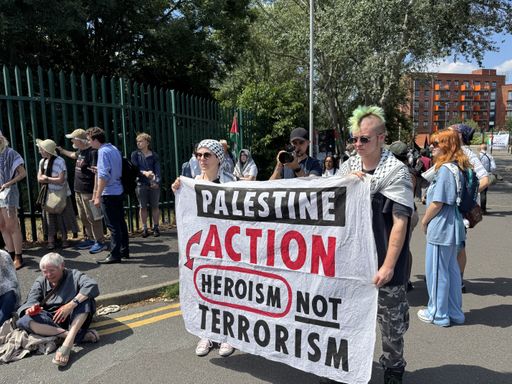On Wednesday, the UK Parliament voted overwhelmingly — 385 to 26 — to proscribe Palestine Action, a pro-Palestine activist group, as a terrorist organisation under the country’s Terrorism Act 2000.
This decision places the group on the same legal footing as entities like Daesh and al-Qaeda, making membership or support a criminal offence punishable by up to 14 years in prison.
What makes Palestine Action stand out?
Founded in 2019, Palestine Action is a direct action group that targets UK-based companies linked to the Israeli military, particularly Elbit Systems, a major arms manufacturer. The group's strategy includes occupations, property damage, and vandalism, actions that have led to multiple arrests and significant media attention.

In June 2025, members of Palestine Action broke into RAF Brize Norton, the UK's largest Royal Air Force base, and sprayed red paint on the engines of two Voyager aircraft, causing an estimated £7 million ($9.6 million) in damage. This incident prompted a nationwide security review and became the pretext for the group's proscription by the UK government.
Why the UK government fears Palestine Action
The government's rationale for banning Palestine Action centres on national security concerns.
Home Secretary Yvette Cooper described the group's actions as "unacceptable criminal damage" and argued that their online presence has enabled them to "galvanise support, recruit and train members across the UK to take part in criminal activity".
However, critics argue that the proscription represents a disproportionate response to non-violent dissent. Human rights organisations have condemned the move as a "disturbing legal overreach," warning that it could suppress free speech and civil liberties.

United Nations experts appointed by the UN Human Rights Council have urged Britain to reconsider its move, arguing that acts of property damage without the intention to endanger life should not be considered terrorism.
Demographics of Palestine Action's supporters
While detailed demographic data on Palestine Action's membership is limited, the group has garnered significant support among younger activists.
Many of its protests and direct actions are organised through social media platforms, which are popular among younger demographics. The group's emphasis on direct action and its focus on Israel’s war against Gaza resonates with many young people seeking to make an immediate impact on global issues.
Palestine Action's ranks have grown notably among young White British activists, especially since the escalation in Gaza in late 2023. Once seen as a fringe movement, it now attracts university students, teachers, NHS workers, and climate activists, many previously aligned with Just Stop Oil or Extinction Rebellion.
The group has seen a surge in sign‑ups since October 2023, including “a young mother, a TV producer, many doctors, delivery drivers, primary‑school teachers”, as per a member of the group.
This indicates that recruits are not exclusively Muslim or from traditional activist circles, but rather drawn from mainstream UK professions and backgrounds.
Their appeal lies in the group’s uncompromising, high-impact tactics and its clear moral framing: direct action against companies profiting from Israel’s war crimes.
Numerous rooftop and university actions (eg, Cambridge Senate House, Edinburgh Leonardo factory) show students, many of whom are White British, taking part in direct, disruptive action.
This shift has alarmed the UK government, not only because of the group’s tactics, but because its messaging now resonates far beyond traditional activist bases, into Britain’s White, middle-class youth.
Legal and political implications
The banning of Palestine Action has sparked a broader debate about the balance between national security and the right to protest. Legal experts caution that the move could set a precedent for criminalising other forms of protest and dissent.
The decision is expected to face legal challenges, and its final approval rests with the House of Lords, which is set to debate the matter in the coming days.



















